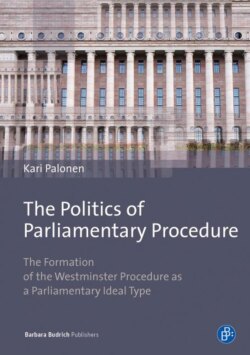Читать книгу The Politics of Parliamentary Procedure - Kari Palonen - Страница 6
На сайте Литреса книга снята с продажи.
Оглавление[8][9]Acknowledgements
Twenty years ago I could not have believed that I would ever become a parliamentary scholar. Quentin Skinner’s Reason and Rhetoric in the Philosophy of Hobbes (1996) has inspired a number of scholars to reinterpret British parliamentary politics, and this book with its procedural perspective is the latest one indebted to Skinner and his rhetorical work.
For ten years I have been delving into the strange world of parliaments from a scholarly distance. However, this study also manifests continuities with other major topics of my research profile: the concept of politics and its history, the principles and practices of conceptual history as well as Max Weber’s political thought and methodology in particular. While I am getting closer to political practice, in the study of procedural tracts I employ an indirect perspective on parliamentary politics. I take a historical approach to the study of politics, though I am not a historian by profession. Although the tracts studied concern the particularities of the British parliament, as a Weberologist I treat it as a historical approximation of the parliamentary ideal type.
Quentin Skinner has read the 2012 draft of the manuscript, and Suvi Soininen the first draft of the present version. I am also indebted to two anonymous reviewers, whose comments prompted me to revise the entire narrative of the work.
This work would not have been possible without Academy of Finland research grants. The project The Parliamentary Style of Politics (with Tapani Turkka, Suvi Soininen and Sarita Friman-Korpela) was followed by the Academy Professorship project The Politics of Dissensus. Parliamentarism, Rhetoric and Conceptual History (with Tapani Turkka, Taru Haapala and Hanna-Mari Kivistö as the core team; Anna Björk, Anna Kronlund, Jussi Kurunmäki, Anthoula Malkopoulou, Onni Pekonen, Suvi Soininen and Tuula Vaarakallio as part-time participants; and Ratih D. Adiputri, Marie-Christine Boilard, Sarita Friman-Korpela and Hanna Kallio in the wider PhD team). The Finnish Centre of Excellence in Political Thought and Conceptual Change offered a broader range of cooperation opportunities (in particular, with Matti Hyvärinen, Pasi Ihalainen, Anitta Kananen, Kia Lindroos, Tuija Parvikko, Tuija Pulkkinen, Evgeny Roshchin, Henrik Stenius, Vasileios Syros and Claudia Wiesner).
[10]I am further indebted to the late Michael Th. Greven and to Jörn Leonhard for research periods at Warburg-Haus in Hamburg 2006 and at FRIAS, School of History, in Freiburg 2009, to José María Rosales and his research projects (an extensive volume by the Jyväskylä and Málaga teams, see Palonen/Rosales/Turkka (eds.), The Politics of Dissensus: Parliament in Debate, 2014) as well as to Pasi Ihalainen and Cornelia Ilie as co-editors of Parliament and Parliamentarism, forthcoming in the new European Conceptual Histories series. With Claudia Wiesner and Tapani Turkka I also co-edited the volume Parliament and Europe (2011). Among senior scholars, Frank Ankersmit, Pantelis Bassakos, Hubertus Buchstein, Alan Finlayson, Marcus Llanque, Kyösti Pekonen, Markku Peltonen, Sia Spiliopoulou Åkermark, Willibald Steinmetz and Nadia Urbinati have also inspired this study.
Bill Hellberg has done a thorough job correcting my English. Anna Kronlund proofread the version before submission to the publisher, and Eleanor Underwood suggested the final linguistic revisions. Jakob Horstmann and Sarah Rögl have been responsible for the ease of the publication process with Budrich Academics.
Helsinki and Jyväskylä, May 2014
Kari Palonen
